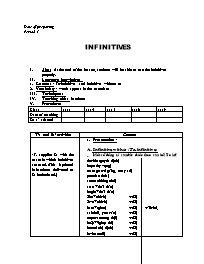Bài soạn môn học Tiếng Anh lớp 11 - Period 1: Infinitives

I. Aim: At the end of the lesson, students will be able to use the infinitives properly.
II. Language knowledge:
1. Grammar: To-infinitive and Infinitive without to
2. Vocabulary: words appear in the exercises
III. Techniques:
IV. Teaching aids: handouts
V. Procedure:
Bạn đang xem tài liệu "Bài soạn môn học Tiếng Anh lớp 11 - Period 1: Infinitives", để tải tài liệu gốc về máy bạn click vào nút DOWNLOAD ở trên
Date of preparing Period: 1 INFINITIVES Aim: At the end of the lesson, students will be able to use the infinitives properly. Language knowledge: Grammar: To-infinitive and Infinitive without to Vocabulary: words appear in the exercises Techniques: Teaching aids: handouts Procedure: Class 11a1 11a4 11a5 11a6 11a9 Date of teaching Sts s’ adsend T’s and Ss’ activities Content - T. supplies Ss with the cases in which infinitives are used. (This is printed in handouts delivered to Ss beforehand.) Presentation: A. Infinitive with to / To-infinitive: Moät soá ñoäng töø sau ñaây ñöôïc theo sau bôûi To inf. decide (quyeát ñònh) hope (hy voïng) manage (coá gaéng, xoay sôû) promise (höùa) seem (döôøng nhö) start * (baét ñaàu) begin* (baét ñaàu) like* (thích) + (O) love* (thích) + (O) hate* (gheùt) + (O) + To-inf. ask (hoûi, yeâu caàu) + (O) expect (mong ñôïi) + (O) help**(giuùp ñôõ) + (O) intend (döï ñònh) + (O) invite (môøi) + (O) want (muoán) + (O) wish (öôùc, muoán) + (O) allow (cho pheùp) + O advise (khuyeân) + O get + O tell (baûo) + O Example: - We decided to make a trip to Dalak. - She wants to have a cup of tea. - My cousin wanted me to take her to the supermarket. - My grandparents often advise me to study hard. * Löu yù: + Ñoäng töø vôùi * coù theå ñöôïc theo sau baèng To infinitive hoaëc V-ing + Ñoäng töø vôùi ** coù theå ñöôïc theo sau baèng To infinitive hoaëc Infinitive without to To-infinitive coù theå ñöôïc duøng sau moät soá tính töø chæ nhöõng phaûn öùng, vaø caûm giaùc cuûa con ngöôøi. delighted (vui) lovely (đáng yêu) pleased (vui, haøi loøng) anxious (boàn choàn, lo laéng) shocked (bò sock) surprised (ngaïc nhieân ) + To inf happy (hạnh phúc) glad (vui, haân haïnh) afraid (ngaïi) sorry (laáy laøm tieác) Example: I’m glad to come to your party today. To-infinitive coù theå ñöôïc duøng ñeå noùi veà muïc ñích, hoaëc yù ñònh laøm vieäc gì ñoù: Example: She learns English to find a good job To-infinitive coøn ñöôïc duøng trong caùc caáu truùc sau: TOO + adj + (for someone) + to inf. adj + ENOUGH + to inf. Example: - The tea is too hot (for me) to drink. - He’s strong enough to lift this stone. e. To-infinitive cuõng ñöôïc duøng trong maãu caâu vôùi chuû töø giaû “It”: It is (not) impossible + for someone + to -inf. easy important necessary usual Example: It’s impossible for him to find a job now. f. Chuùng ta coù theå söû duïng to infinitive sau moät soá danh töø hoaëc ñaïi töø nhö laø moät thaønh phaàn boå nghóa cho caùc danh töø hoaëc ñaïi töø ñoù ñeå thay theá cho moät meänh ñeà quan heä. Example: I have a lot of work to do. = I have a lot of work which I have to do. g. Nhöõng ñaïi töø baát ñònh nhö something, anything, nothing vaø nhöõng töø töông töï thöôøng ñöôïc theo sau bôûi “ for + O + to inf” Example: There’s nothing for the cats to eat. B. Infinitive without to / VBI (verbs bare inf) Sau ñoäng töø let vaø make laø moät taân ngöõ vaø moät cuïm VBI let ( ñeå), make (baét, buoäc) + O + VBI Example: - The film made me cry. - Let me go! b. Infinitive without to / VBI coøn ñöôïc duøng sau nhöõng ñoäng töø sau: see, watch, hear, smell, feel. Example: - I feel the earth move. - We watched Liverpool and Manchester play on TV last night. (xem heát traän ñaáu) * Löu yù: Sau caùc ñoäng töø see, watch, hear ta duøng VBI khi haønh ñoäng ñöôïc chuùng ta thaáy (see), xem (watch), nghe (hear) Practice: Complete each of the following sentences with to-inf and/or inf without to: I’ve decided (buy) a new apartment. What time do you expect (arrive) in Chicago? That T-shirt makes you (look) younger. Let me (post) that letter for you. It’s important for students (do) their homework. I promise you your order will (send) today. She went to the post office (buy) some stamps. He isn’t tall enough (reach) the top sheft. We listened (sing) a song. I heard her (shout) at the children. It’s too cold for us (go) swimming today. It takes 5 hours (fly) from Los Angerles to Honolulu. I saw her (across) the road. They have a lot of homework (do) .. John is easy (please) I’m sorry ( have troubled) you. It’s late. I think we had better (go) home. We can (leave) soon. Don’t let the children (annoy) you. We want (stay) home tonight. My father allowed me (use) the camera. People use their money (buy) and (sell) things. She asked us (sit) down and went (make) some coffee. Tim is too young (join) the army. The movie was very sad. It made me (cry) Would you like (come) to dinner on Friday? It took us three hours (get) here. I’d rather (go) (shop) than anything else. I wonder if you’d be kind enough (help) me. The robbers forced the manager (open) the safe. - T. sets homework. - Ss do the task at home. Homework: Revise today’s lesson. Do all the exercises again. Comments: ..
Tài liệu đính kèm:
 giao an tu chon 17.docx
giao an tu chon 17.docx





